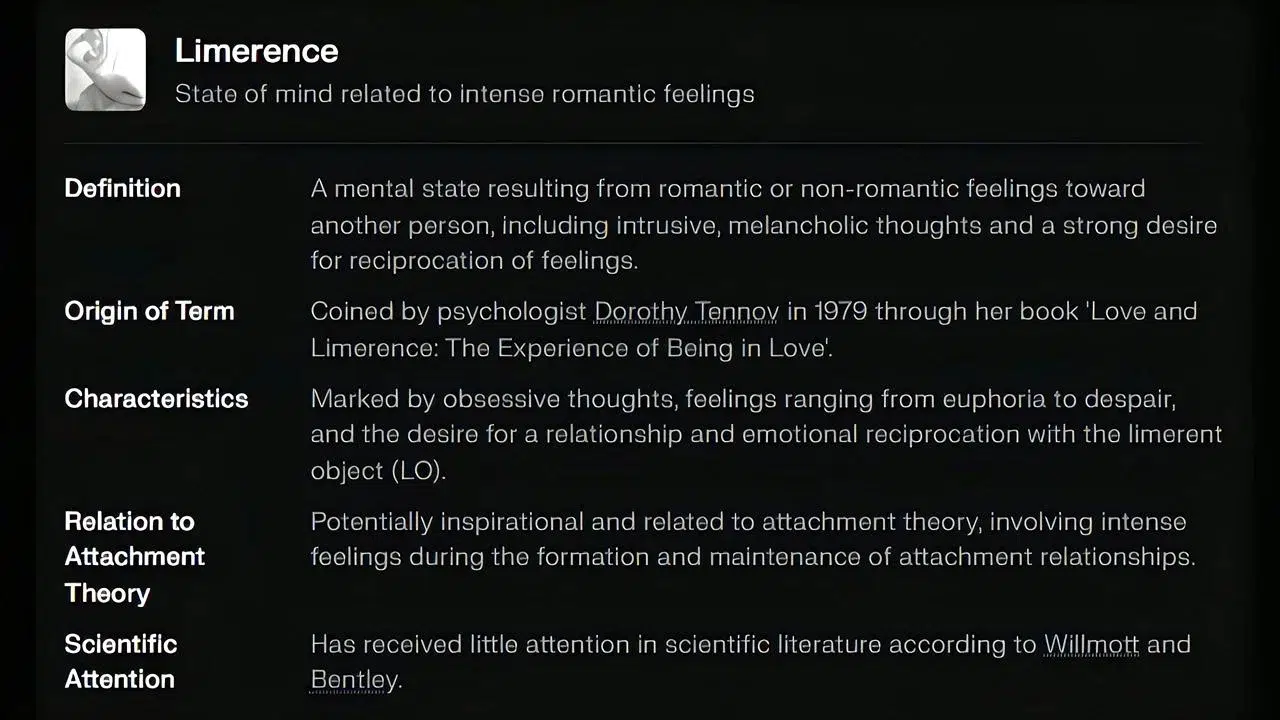Today's Friday • 13 mins read
— Researched and written by Dr. Sandip Roy.
Limerence is a state of involuntary romantic infatuation with another person, especially combined with an overwhelming, obsessive need to have one’s feelings reciprocated.
Limerence starts suddenly and unexpectedly, making you occupied by intrusive thoughts and daydreams about the person you’re attracted to.
It is different from love, though some describe it as the first stage of romantic love, especially among the young. The limerent person feels anxiety, uncertainty, obsession, and even chest pains (heartache).
If you find yourself stuck in limerence, you have to be gentle with yourself as you take steps to break free from it.
When you have a massive crush on someone, and you want them to like you back, to the point where you can’t stop thinking about them, here are seven steps to overcome it:
Step 1: Acknowledge & Accept The Situation
Stop lying to yourself that what you’re feeling is normal.
It’s normal to have a crush on someone, and even tell them about it. But it’s not normal to do desperate things to make them love you back.
The main problem with limerence is the intense desire for reciprocation and control over your one-sided romance.

Recognize that and name your current state of mind. Knowing that you’re in limerence, not love, is the first step to handling your emotions and finding a way forward.
Acceptance can be challenging, but necessary.
Accept that your feelings are overpoweringly disturbing your mental balance. Make yourself understand that, despite the strong urges, you don’t need to act on your impulses to make them reciprocate your love.
Step 2: Express Your Feelings Through Writing
Writing therapy can help you express your feelings, thoughts, and fantasies about your limerent object.
This can serve as a powerful emotional outlet, letting you externalize your thoughts, and thereby reducing the intensity of your emotions.
Writing can also provide valuable insights into your emotional patterns and triggers, helping you better understand your limerence.
Here’s how to do it:
- Find a quiet and private space where you can write undisturbed.
- Start writing about your limerent object and how you feel about them.
- Don’t worry about the structure or grammar of your writing; just let your thoughts flow freely.
- Write about your hopes, fears, fantasies, and anything else that comes to mind when you think about the person.
This written account can become a personal reflection tool, allowing you to identify patterns in your thoughts and emotions.
Over time, you may notice certain triggers or recurrent themes that fuel your limerence, which can be targeted in your recovery process.
The act of putting pen to paper can sometimes help to reduce the power of your feelings, allowing you to regain control over your emotional state.
Finally, writing also helps you with self-reflection, self-assessment, and self-discovery. It helps you in other areas of life.
Step 3: Practice Mindfulness Activities
Mindfulness practice can be a highly helpful strategy to overcome your limerence.
Mindfulness involves becoming keenly aware of your present experiences – your thoughts, feelings, and bodily sensations – without judgment or avoidance. This increased self-awareness can help you identify and manage the powerful emotions associated with limerence.
Here’s how to implement it:
- Begin with spending a few minutes each day mindfully focusing on your breath.
- Feel the sensation of breathing air entering and leaving your body.
- Notice the sensations, sights, sounds, and smells of what you’re doing.
- When your mind wanders, as it inevitably will, gently bring your attention back to your breath.
You can also practice mindfulness during routine activities, such as eating, walking, or washing dishes.
Integrating mindfulness into your daily routine stops your mind from wandering to the object of your limerence, and instead, keeps you rooted in the present moment.
Over time, mindfulness can help you become more aware of your inner emotional landscape.
You may begin to notice when feelings of limerence start to arise, and rather than getting caught up in the intensity, you can observe them with curiosity and let them pass.
This capacity to ‘sit with’ your emotions, rather than impulsively acting on them, can be a powerful tool in your journey out of limerence.
Mindfulness is a skill that takes time to develop. So be patient with yourself, and keep practicing.
Here’s our 15-Minute Mindfulness Meditation Guide.
Step 4: Establish Boundaries
Establishing boundaries with your limerent object is vital for overcoming your limerence.
This can be particularly difficult because these boundaries are for yourself and only you know of these.
Boundaries help to protect your emotional well-being by limiting your exposure to the source of your limerence.
They serve as guidelines for acceptable behavior, helping to prevent situations that might exacerbate your limerence.
Here’s how to set boundaries:
- Begin by determining what type of contact or interaction with your limerent object intensifies your feelings.
- This could be anything from one-on-one meetings, certain topics of conversation, or even digital contact through social media.
- Once you’ve identified these triggers, establish clear and firm boundaries to limit or avoid these interactions.
- Communicating these boundaries to yourself in a way that is prominent is necessary, like making a poster and displaying it in a prominent place.
Be clear about your needs and what you’re comfortable with. If you cannot express or follow boundaries, consider asking for the help of a trusted friend or therapist.
Setting boundaries isn’t just about managing external interactions. It’s also about regulating your internal responses.
This means consciously choosing not to indulge in fantasies about the limerent object or to obsess over them.
Step 5: Engage in Distractions
Engaging in distractions, specifically activities that you genuinely enjoy, can prove invaluable in diverting your attention and energy away from your limerent object.
They offer an opportunity to reclaim your mental space, steering your focus towards your personal growth and enjoyment.
Make a list of activities that have captivated you in the past or new hobbies you’ve been meaning to try. These could be anything from painting, playing a musical instrument, hiking, reading, cooking, or even learning a new language.
The key is to find something that genuinely interests you and has the potential to immerse your attention.
Once you have your list, start incorporating a few of these activities into your daily or weekly routine.
Fix a dedicated time to spend each day or week doing these activities.
If you can, make these activities social ones. Engage with a group of like-minded people who share your interests. This not only enriches the experience but also provides an additional layer of distraction – social interaction.
These enjoyable activities should serve a dual purpose.
- One, they distract you from the thoughts and fantasies about your limerent object.
- Moreover, they contribute positively to your self-improvement, self-worth, and identity.
As you engage more with these activities, you’ll likely find that your identity becomes less tied to your limerence and more about the unique and varied individual that you are.
Remember, the goal isn’t just to distract yourself, but to build a life that you love and enjoy, independent of your limerent object.
Be patient with yourself and understand that it’s okay to have moments of slip-ups.
Gently guide yourself back to your hobbies and interests each time you find yourself having stopped them.
Celebrity Limerence: Why We’re Obsessed With Famous People?
Step 6: Seek Support
Finding help from caring people can be a big help in your journey to overcome limerence.
You get a chance to talk about your feelings which helps you see your situation in new ways. This can help break free from the self-fulfilling cycle of limerent thoughts.
Think of the people in your life who have been understanding, non-judgmental, and kind in the past. They could be good friends, family members, or even teachers or coaches.
- Choose a few from them and talk to them, sharing your feelings and experiences.
- Be honest about what you’re going through, and let them know you need their help.
- Remember, it’s okay to express your feelings with vulnerability.
- Letting others know how you feel can often make the feeling of being alone that limerence can create feel less strong.
Seek help from a professional, like a therapist or counselor. They may not be specifically trained to deal with limerence, but research has found therapeutic techniques that work on obsessive-compulsive disorder (OCD) work well on limerence.
They can give you a safe and accepting place to talk about your feelings and also teach you useful ways to balance your limerence with your normal duties.
Support groups, both in person and online, may also be very helpful. Meeting with other people who are going through the same thing can make you feel less alone. Others’ experiences can also teach you a few ways of coping.
When you’re looking for support, remember that everyone’s experience is different, and what works for one person might not work for another.
Listen to the advice that feels right to you and fits your situation. And feel free to get a second opinion.
Step 7: Be Patient With Yourself
Finally, and perhaps most importantly, remember that patience with your intensely emotional self is key.
Overcoming limerence is not an overnight process. Expect to experience both highs and lows and tell yourself this when things get difficult.
See your progress as a voyage of many steps, some that take you forward and some that take you back, but all of which are essential for your recovery.
Acknowledge that feelings of limerence are strong and intense. It takes time to heal and untangle these strong emotions.
You’re dealing with powerful feelings, and it’s okay if it takes a while to work through them. You’re not in a race, and there’s no deadline for getting over limerence.
Next, celebrate every bit of progress you make, no matter how small it may seem.
- Did you manage to distract yourself from thinking about your limerent object for a few hours? Great.
- Did you open up about your feelings to a friend or family member? That’s a huge step forward.
These small victories add up over time and lead to big changes. Give yourself a pat on the back whenever you make progress.
Also, be kind to yourself when you have setbacks. On days when you feel like you’ve taken a step backward, instead of beating yourself up, remind yourself that setbacks are part of the process.
Use these learning experiences to figure out what triggers your limerent feelings and how you can better handle these situations in the future.
Lastly, keep focus on your emotional health and well-being.
Stay committed to your self-care routines, maintain healthy boundaries, and continue seeking support when needed.
This journey is about you and your well-being. All your efforts are worth it
Understanding Limerence
Limerence is an involuntary, intense feeling of attraction towards another person, often accompanied by obsessive thoughts and fantasies.
Psychologist Dorothy Tennov coined the term “limerence” in her book, Love and Limerence: The Experience of Being in Love.
Her extensive research findings help us grasp the intricacies of limerence and how it differs from love and infatuation.

Some key traits of limerence include:
- Intrusive thoughts: You constantly think about the limerent object (the person you’re attracted to), even when you don’t want to.
- Mood swings: Your emotions fluctuate rapidly, from euphoria when the limerent object shows interest to despair when they seem indifferent.
- Fear of rejection: You experience intense anxiety about the possibility of rejection and the potential harm it could cause.
- Idealization: You idealize the limerent object, overlooking any flaws or rational concerns.
Limerence vs. Infatuation vs. Love
Understanding the distinctions between limerence, infatuation, and love is crucial for recognizing and navigating these emotional states. Here are some key differences:
- Limerence: As mentioned earlier, limerence primarily revolves around obsessive thoughts and intense feelings for someone. It may last for a few weeks or even years, and is often one-sided.
- Infatuation: This state is characterized by a short-lived, superficial attraction towards someone. You might feel a strong desire to be with the person, but these feelings usually fade quickly once you become more familiar with them.
- Love: Love is a deep emotional bond that develops gradually over time. It involves mutual affection, trust, respect, and understanding between two people. Unlike limerence and infatuation, love is a stable emotion that fosters healthy, long-lasting relationships.
By comprehending these differences, you can better identify the emotions you’re experiencing and take appropriate steps to address them.
FAQs
How do I overcome obsessive thoughts in limerence?
What are the signs that limerence is ending?
What triggers the onset of limerence?
How can I cope with limerence-related abandonment?
What strategies help in transferring limerence?
I have consulted 3-4 limerent individuals in my 10+ years of practice. Most of them were young teens.
Only one person was middle-aged, well-established in their career, and lived with their family. This person consulted me on their own (they understood their issue).
But it proved difficult for me to get them to overcome their limerent feelings — they have lived their adult life and had answers and reasons for all my advice.
Finally, after 5 or so meetings, I had to refer them to another psychologist colleague of mine.
— Dr. Sandip Roy
Final Words
Here are three key takeaways:
- Accepting that limerence is controlling your feelings is the first step to feeling better.
- Doing things you love, and talking to people who care are good ways to reduce limerence.
- Being kind to yourself and celebrating even small wins can help you feel emotionally healthy.
√ Also Read: Unrequited Limerence – The Pain of Unreturned Obsessive Love
√ Please spread the word if you found this helpful.
• Our Story!
» You deserve happiness! Choosing therapy could be your best decision.
...
• Disclosure: Buying via our links earns us a small commission.
